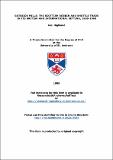Gateside Mills : the Scottish bobbin and shuttle trade in its British and international setting, 1860-1960
Abstract
Within these 100 years, 1860-1960, in the east of Scotland,
a highly specialised woodworking industry closely associated with
flax and jute manufacturing, grew from modest beginnings to a
position of some importance in the economy of this country.
Eventually it declined to a point of virtual extinction leaving
few traces of the unique skills and innovatory processes it once
employed.
The principal products of this industry, bobbins and shuttles,
have been fundamental to the crafts of spinning and weaving for
thousands of years but the industrialisation of the textile trade
in the 19th century stimulated a demand for very large quantities
of these components manufactured to engineering standards of precision.
Consequently there emerged in mid-century an industry which, in the
early years, served the flax and jute mills of Scotland and later,
the far larger operations in India which by 1914, had achieved
the world leadership in jute manufacturing.
This research sought to examine the reasons for the growth and
decline of this Scottish trade, its unusual methods and remarkable
skills and the long-lasting connection with India it enjoyed. The
investigations were centred on the Gateside Mills, a firm in Fife
typical of those involved, whose records originated in the late
19th century. This material together with evidence from other sources
provided not only an insight into the industry overall and the working
conditions of those employed, but also an account of the conduct
of a comparatively small company with extensive overseas trading
interests, in times of peace and war.
Type
Thesis, PhD Doctor of Philosophy
Collections
Items in the St Andrews Research Repository are protected by copyright, with all rights reserved, unless otherwise indicated.

